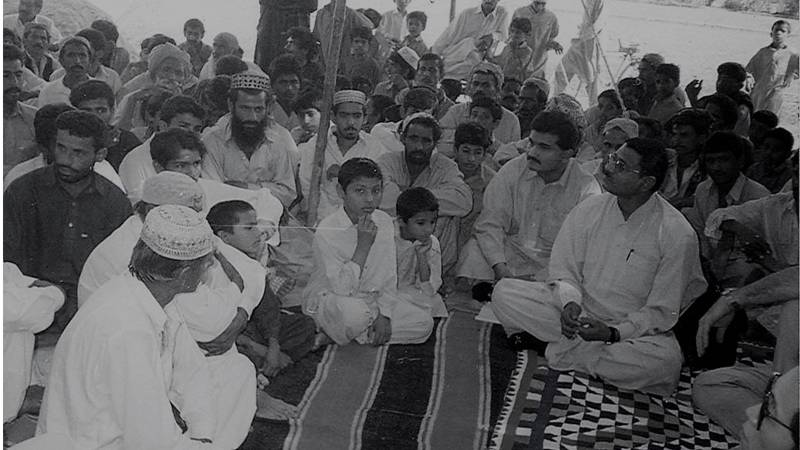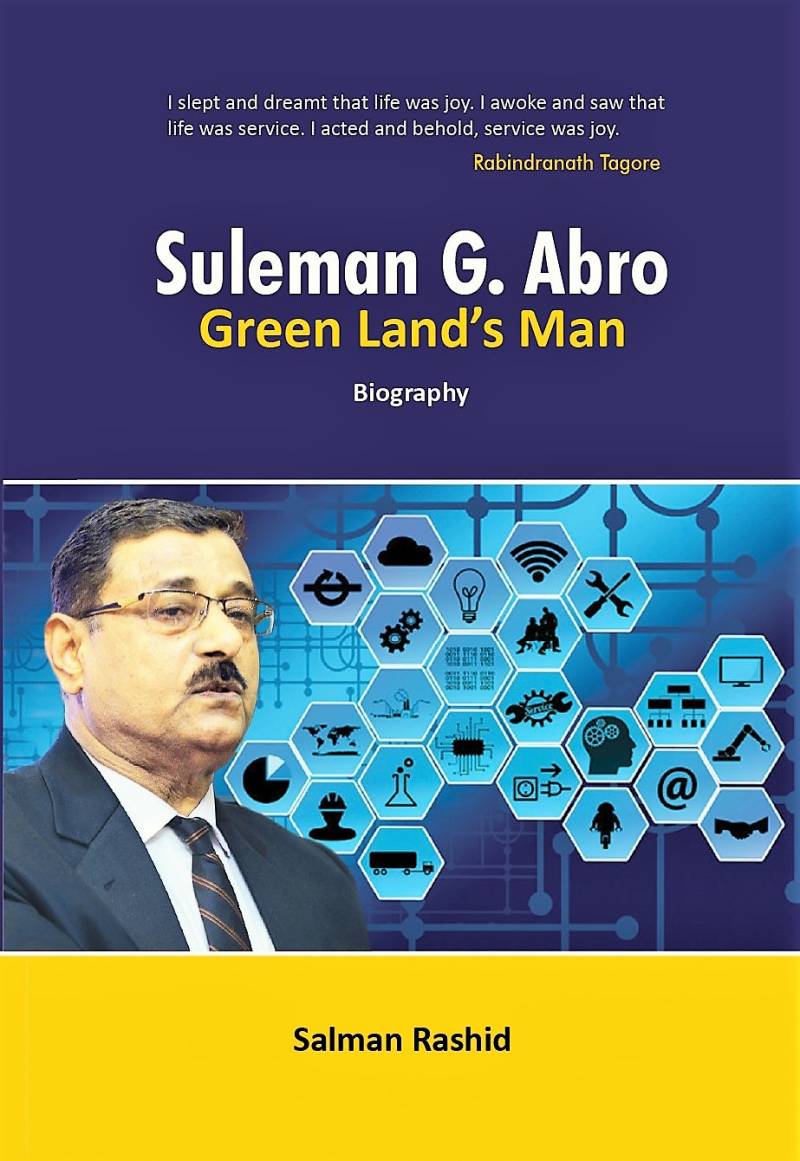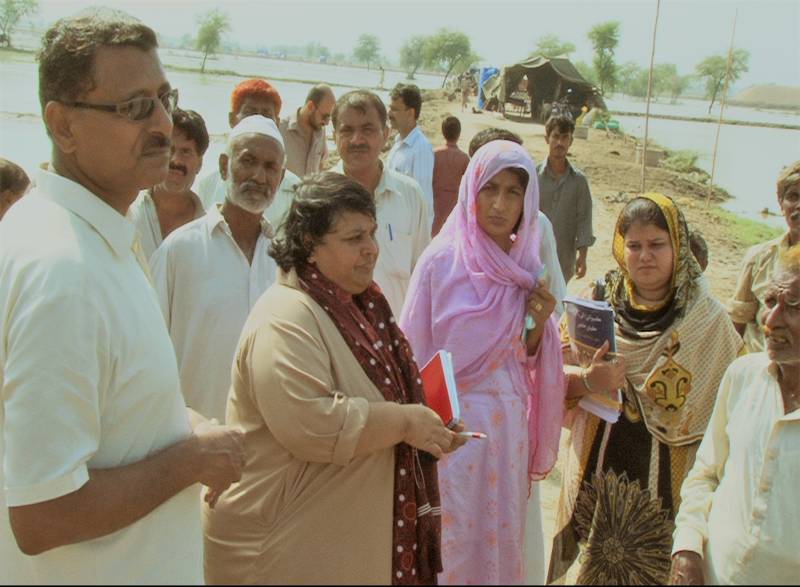
Suleman G. Abro: Green Land’s Man is a biographical book authored by Salman Rashid. It showcases the remarkable and inspirational journey of Suleman G Abro, a man whose tireless dedication to improving his community and his unwavering commitment to positive change have left an indelible mark. This biography, published by Sang-e-Meel Publishers Lahore, spans twenty captivating chapters, which can be neatly categorised into two broader sections: the personal struggles and triumphs of Suleman Abro, and the profound impact of his organisational efforts on society.
Before delving into the book's content, I would like to share a personal anecdote that underscores the importance of this biography. In the early 1990s, I had the privilege of attending an international training workshop in London, with support from NGORC, a project of the Aga Khan Foundation. Surprisingly, throughout the sessions, there was a conspicuous absence of references to Pakistan's development experiences. The same gap was evident in other forums. It wasn’t until the last decade that some writings began to shed light on Pakistan's developmental journey. In this regard, we could count Dr Akhtar Hameed Khan’s Orangi Pilot Project: Reminiscences and Reflection (2005), Shoaib Sultan Khan’s book on his northern experience The Aga Khan Rural Support Programme: A Journey Through Grassroots Development’ (2009), The Man in the Hat (2013), Dr Amjad Saqib’s book Akhuwat Ka Safar (2014) and Arif Hasan’s recently published book, Tharparkar – Drought, Development, and Social Change (2023).
But, in the realm of literature, there exists a considerable distance between the authors of the books mentioned earlier and the protagonist of this biography, Suleman Abro. This disparity arises from the stark contrast in their backgrounds and life experiences. The previous authors were privileged, having attended esteemed colleges and universities, born into affluent families, and blessed with influential social and political connections. In contrast, Suleman Abro emerges as a remarkable figure whose journey defies all odds and captivates the essence of resilience. However, the positive outcome of all these publications lies in the documentation of developmental experiments and personal accounts of the implementers. These books are bound to be cited, referred to, and discussed by scholars and academia. They will generate new debates and foster different perspectives. Rest assured, Pakistan's perspective will undoubtedly be cited and discussed at international forums, adding to its influence and recognition on a global scale. This exciting prospect promises to bring about engaging and thought-provoking discussions that will shape the future of the development sector of the country.

The present book tells us that in his humble beginnings, Suleman Abro toiled through various odd jobs, his determination acting as the driving force behind his pursuit of education. Without the advantages of wealth or social status, he embarked on a path of self-education, gradually accumulating knowledge and wisdom through his own relentless efforts. Hailing from a modest village, he found himself in a world far removed from the corridors of power and privilege. Yet, it is precisely against these formidable odds that Suleman Abro's true character shines. Instead of succumbing to the limitations imposed by his circumstances, he dedicated himself to serving the marginalised and underprivileged communities. Through his unwavering commitment, he transcended the boundaries of social class and positioned himself among the esteemed ranks of the country's established elite. Suleman Abro's journey is a testament to the triumph of perseverance, compassion, and the indomitable spirit of human potential. His story resonates with the universal human desire for upward mobility and the pursuit of justice. It serves as a powerful reminder that greatness can emerge from the most unlikely of origins.
As we delve deeper into the pages of this biography, we are invited to witness the extraordinary transformation of an ordinary individual who defied all societal expectations. Suleman Abro's life story not only inspires but also challenges our preconceptions about success, reminding us that true greatness lies not in inherited privilege but in the unwavering pursuit of one's dreams, regardless of the obstacles faced along the way.
Prepare to be captivated by the remarkable journey of Suleman Abro as we embark on an exploration of his life, his triumphs, and the lasting impact he has made on the lives of those he touched. This biography promises to be a compelling narrative of resilience, hope, and the enduring power of the human spirit. It fills a void by offering a personal account of a man who dedicated his life to making a difference in his community.
The book’s narrative is spread across 421 pages, but the content naturally falls into two distinct sections. The first section takes us through Suleman Abro's early life, marked by hardship and struggle, where he worked as a labourer and borrowed books to support his education. These formative years instilled in him a deep commitment to alleviating the suffering of others. Alongside his friends, he initiated a novel experiment by collecting old school books from fellow students, and the positive response from his teachers served as a testament to the impact of their efforts.

Suleman’s life is a testament to relentless learning and self-improvement, as he juggled various jobs, including being a punkha-puller, labourer, presser and local government employee, all while continuing his education. His insatiable thirst for knowledge led him to the municipal library, where he delved into the works of renowned authors and intellectuals. His literary endeavours and contributions to Sindhi newspapers showcased his dedication to addressing issues faced by farmers and rural communities. The narrative then unfolds to reveal Suleman's expansion into nearby villages, where he spearheaded initiatives to provide educational opportunities and basic facilities. His partnership with organisations like the Sindh Graduates Association and the Pakistan Institute for Labour Education and Research exposed him to transformative ideas and ignited a newfound clarity of vision. He understood that collective action and heightened awareness within communities were essential for uplifting the disadvantaged.
The second part of the book focuses on the establishment and achievements of the Sindh Agriculture and Forestry Workers Cooperative Organisation (SAFWCO). Formed in 1986 and registered in 1993, SAFWCO's journey is a testament to organisational and programmatic success, including the creation of Rural Women's Organisations, Micro-Credit Schemes, Health and Hygiene Initiatives, and more. SAFWCO's notable achievements include tackling honour killings and partnering with the Pakistan Poverty Alleviation Fund to uplift ultra-poor communities in the Indus Delta region. What truly stands out in this section are the inspiring stories of transformation, leadership, and behaviour change among men and women from across Sindh. Local leaders, empowered by SAFWCO, facilitated positive change in their communities, leading to tangible results such as lined irrigation channels and increased crop yields in distant villages. Equally impressive are the accounts of young girls who, after attending training sessions on human rights, emerged as powerful agents of change and education advocates. The book also shines a light on the generous donors who have supported SAFWCO's initiatives over the years. It offers insight into the diverse range of themes addressed by the organisation, from women's empowerment and clean water advocacy to non-formal education and livestock management. These themes reflect SAFWCO's responsiveness to the challenges faced by rural communities.
One remarkable aspect of this biography is the long list of donors and partners who have shown their commitment to the welfare of the poor in Sindh. Their support has been instrumental in driving change and innovation. The book also celebrates the creation of the SAFWCO Support Foundation, a subsidiary that has excelled in microfinance in Pakistan and is on a transformative journey to become a full-fledged microfinance bank. Suleman Abro strives for this transition to a for-profit bank, a testament to his remarkable vision.
In conclusion, let me state that the present biography is not only a tribute to Suleman G Abro but also a significant addition to the genre of biographies. It is a compelling narrative that showcases the power of resilience, dedication, and collective action to drive change in even the most challenging circumstances. The stories of the men and women within are a source of inspiration, shedding light on the journey of a humble man who overcame tremendous odds to create a path for future generations. This book not only complements the legacies of figures like Professor Muhammad Yunus and Fazle Hasan Abed but also serves as a testament to Asian change-makers and their role in reducing rural suffering. It is a valuable addition to the literary world, and I wholeheartedly recommend it to all who seek inspiration and hope in the face of adversity. In fact, I would even say that Suleman G. Abro: Green Land’s Man is a book that deserves to be celebrated.

